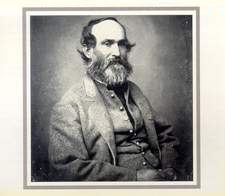| Jubal Anderson Early |
| BACK |
 |
November 3, 1816 - March 2, 1894
About six feet tall, but thin and stooped from arthritis, Jubal A. Early did not look like what he was -- one of Robert E. Lee's best and hardest fighting generals. The West Point-trained Virginian was an attorney and a legislator who had voted against secession before the Civil War. Early was a heavy drinker with an abrasive tongue and an irascible personaliy, but his men were quite fond of their colorful commander and called him "Old Jube" or "Old Jubilee." Early volunteered his services at the outbreak of hostilities and served with distinction as a brigade commander at the 1st Battle of Bull run. He was promoted to brigadier general after the battle and served in the Peninsular Campaign, during which he was wounded in the shoulder at Williamsburg. Early recovered to return to duty for the Battle of Malvern Hill and then fought valiantly at Cedar Mountain and 2d Bull Run. His determined fighting at Sharpsburg won him a division command. After a superb performance at Fredericksburg, Early was promoted to major general and continued to be a solid, dependable component of the Southern forces at Chancellorsville and Gettysburg. On several occasions, Old Jubilee's clear head and skillful maneuvering saved his brigade from destruction. Lee appreciated Early's aggressiveness and competence as general, gave him temporary command of a corps on several occasions, and sent him to command the Shenandoah Valley forces in the winter of 1863-64. After the spring fighting at the Wilderness, Spotsylvania, and Cold Harbor, Early was sent back to the valley to conduct his famous raid on Washington. He fought valiantly but uncessessfully against Gen. Phillip H. Sheridan in the Shenandoah Valley in the last year of the war. Early lived in Canada for a few years after the war. he returned to his Virginia law practice in 1869, but remained "unreconstructed" and bitter over the South's defeat until his death in 1894. Fascinating Fact: Lee had to relieve Early of command after his defeat by Sheridan because Lee could not defend his general from the public condemnation without revealing how little the Confederacy had to work with. |
